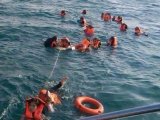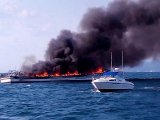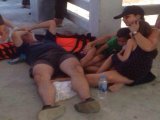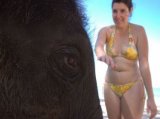AUSTRALIAN military personnel are being deployed to participate in three-nation war games staged close to a South China Sea flashpoint amid fears in the Philippines that China's military is seeking to take control of the disputed region.
The US and the Philippines have doubled the size of their annual 10-day exercises at locations that include a Philippines' naval station 220 kilometres from Scarborough Shoal, a hotly contested area that has been occupied by China since 2012.
More than 60 personnel from Australia's navy, army, air force and Defence Science Technology Organisation will participate in civil-military humanitarian assistance operations on the Philippine islands of Palawan and Panay during the war games called Balikatan that begin on April 20.
While the Philippines insists the exercise is not a show of force against China, US Secretary of Defence Ash Carter on Wednesday kicked off his first Asian tour with a stern warning against the militarisation of territorial rows in the region.
Asked in Tokyo whether the beefed-up war games were a response to China's moves, Mr Carter said Washington and Manila had shared interests in the region, including a desire to ensure there were no changes in the status quo by force.
"We take a strong stance against the militarisation of these disputes," he said.
The warning comes days after US Admiral Harry Harris, commander of the US Pacific Fleet, said in Australia that China's building of a string of new islands in the South China Sea posed a serious threat to stability in the strategically vital and resource rich region that stretches across some of the world's busiest sea lanes.
Satellite images show Chinese workers building ports and fuel storage depots as well as possibly two airstrips that experts have said would allow Beijing to project power deep into the maritime heart of south-east Asia.
China claims most of the South China Sea while the Philippines, Vietnam, Malaysia, Brunei and Taiwan having overlapping claims.
The doubling of the war games to involve more than 12,000 military personnel, more than 100 aircraft and four ships follows a US-Philippines agreement last year that will allow a larger American presence in the Philippines.
The agreement has not yet being implemented while the Philippine Supreme Court hears challenges to it from anti-US groups.
Philippines' military spokesman Lieutenant-Colonel Harold Cabuno said the war games are designed to "increase our capability to defend our country from external aggression".
"It is to test how ready and how effective we can operate with our American allies in both humanitarian and security operations," he said.
Australia is the only country other than the US and the Philippines taking part in the war games and has sent personnel to four other similar operations in the Philippines in the past.
"Exercise Balikatan allows the ADF to further build its defence ties and military-civilian co-ordination skills with the Philippines and United States, as well as enhancing Asia-Pacific regional security and stability," the Australian Defence Force said on its website.
Australian policy is not to take any sides in the South China Sea dispute that it says should be resolved peacefully.
Before leaving the US for Japan and South Korea, Mr Carter portrayed his trip as opening a new phase in the US's strategic "rebalance" toward Asia and the Pacific that will include investing in high-end weapons such as a new long-range stealth bomber, refreshing defence alliance with Japan and expanding trade partnerships.
Mr Carter also signalled that the US plans to deploy more advanced ships and aircraft to the region during a gradual increase in attention to Asia during President Barack Obama's last two years in office.
"We and many other countries are deeply concerned about some of the activities China is undertaking," he said.
with Reuters
The US and the Philippines have doubled the size of their annual 10-day exercises at locations that include a Philippines' naval station 220 kilometres from Scarborough Shoal, a hotly contested area that has been occupied by China since 2012.
More than 60 personnel from Australia's navy, army, air force and Defence Science Technology Organisation will participate in civil-military humanitarian assistance operations on the Philippine islands of Palawan and Panay during the war games called Balikatan that begin on April 20.
While the Philippines insists the exercise is not a show of force against China, US Secretary of Defence Ash Carter on Wednesday kicked off his first Asian tour with a stern warning against the militarisation of territorial rows in the region.
Asked in Tokyo whether the beefed-up war games were a response to China's moves, Mr Carter said Washington and Manila had shared interests in the region, including a desire to ensure there were no changes in the status quo by force.
"We take a strong stance against the militarisation of these disputes," he said.
The warning comes days after US Admiral Harry Harris, commander of the US Pacific Fleet, said in Australia that China's building of a string of new islands in the South China Sea posed a serious threat to stability in the strategically vital and resource rich region that stretches across some of the world's busiest sea lanes.
Satellite images show Chinese workers building ports and fuel storage depots as well as possibly two airstrips that experts have said would allow Beijing to project power deep into the maritime heart of south-east Asia.
China claims most of the South China Sea while the Philippines, Vietnam, Malaysia, Brunei and Taiwan having overlapping claims.
The doubling of the war games to involve more than 12,000 military personnel, more than 100 aircraft and four ships follows a US-Philippines agreement last year that will allow a larger American presence in the Philippines.
The agreement has not yet being implemented while the Philippine Supreme Court hears challenges to it from anti-US groups.
Philippines' military spokesman Lieutenant-Colonel Harold Cabuno said the war games are designed to "increase our capability to defend our country from external aggression".
"It is to test how ready and how effective we can operate with our American allies in both humanitarian and security operations," he said.
Australia is the only country other than the US and the Philippines taking part in the war games and has sent personnel to four other similar operations in the Philippines in the past.
"Exercise Balikatan allows the ADF to further build its defence ties and military-civilian co-ordination skills with the Philippines and United States, as well as enhancing Asia-Pacific regional security and stability," the Australian Defence Force said on its website.
Australian policy is not to take any sides in the South China Sea dispute that it says should be resolved peacefully.
Before leaving the US for Japan and South Korea, Mr Carter portrayed his trip as opening a new phase in the US's strategic "rebalance" toward Asia and the Pacific that will include investing in high-end weapons such as a new long-range stealth bomber, refreshing defence alliance with Japan and expanding trade partnerships.
Mr Carter also signalled that the US plans to deploy more advanced ships and aircraft to the region during a gradual increase in attention to Asia during President Barack Obama's last two years in office.
"We and many other countries are deeply concerned about some of the activities China is undertaking," he said.
with Reuters












